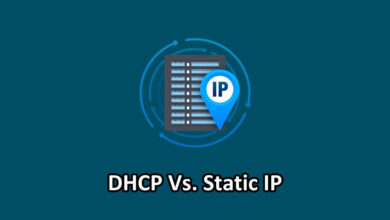DNS Vs VPN : Which Shields Your Online Privacy?
In the ever-evolving landscape of the internet, two key components play a pivotal role in our online experience: DNS (Domain Name System) and VPN (Virtual Private Network).
Understanding the nuances and differences between these two technologies is essential for anyone who traverses the digital realm.
So, let’s embark on this journey of exploration, shedding light on what DNS and VPN are, and why knowing the disparity between them is crucial.
DNS, or Domain Name System, serves as the internet’s address book. It translates user-friendly domain names into IP addresses, ensuring you can reach the websites you desire.
On the other hand, a VPN, or Virtual Private Network, is your virtual cloak of invisibility. It masks your online identity by routing your internet traffic through encrypted tunnels, safeguarding your privacy, and security.
DNS vs. VPN (A Comparison)
| DNS | VPN |
|---|---|
| DNS is a system that translates human-readable domain names (like www.example.com) into IP addresses, enabling computers to locate and connect to each other on the Internet. | A VPN is a technology that establishes a secure and encrypted connection over the internet, allowing users to access a private network as if they were connected to it directly, even when using a public network. |
| DNS facilitates internet connectivity by ensuring that you can access websites and online resources using easily memorable domain names. | VPN enhances online security and privacy by encrypting traffic and masking IP addresses. |
| DNS doesn't inherently provide security. It can be vulnerable to DNS spoofing and other cyber threats. | VPN focuses on security by encrypting data and protecting against interception and unauthorized access. |
| It offers limited privacy. ISP's default DNS may log and track online activity. It doesn't inherently prioritize user privacy. | VPN offers high privacy by hiding IP addresses and ensuring anonymity in online activities. |
| DNS doesn't directly impact your internet speed. It plays a minimal role in how fast websites load. | VPN can have a noticeable impact on speed due to routing through distant servers and encryption. |
| DNS is typically provided by your Internet Service Provider (ISP) and is included in your Internet service package. | Often comes with a subscription fee for premium services; some free options are available but with limitations. |
What is DNS?
At its core, DNS is the phonebook of the internet. When you enter a website’s name in your browser, it’s DNS that translates that name into an IP address. For instance, when you type “www.google.com,” DNS ensures your request reaches Google’s servers with the correct address.
Without DNS, we’d have to remember complex strings of numbers for every website we visit. It’s a fundamental part of internet functionality.
How DNS Works
DNS operates through a distributed network of servers. When you enter a URL, your computer sends a query to a DNS server, typically provided by your internet service provider. If the server has the IP address associated with the domain name in its cache, it responds with the address. If not, it queries other servers in the DNS hierarchy until it finds the answer.
The Role of DNS in Internet Communication
DNS is essential for seamless internet communication. Every click and every search relies on DNS to ensure you reach the right destination. It underpins the entire browsing experience, making it a foundational element of the digital world.
Explain What is a VPN?
A VPN is your online guardian angel. It stands for Virtual Private Network and, as the name suggests, it creates a secure, private network within the public internet. When you connect to a VPN, your internet traffic is encrypted and tunneled through servers located in different parts of the world.
This masks your IP address, making it seem like you’re accessing the internet from a different location.
How do VPNs Function and What is Its Purpose?
VPNs function by routing your data through a secure tunnel, preventing eavesdroppers and hackers from intercepting your information. Their primary purpose is to enhance your online security and privacy.
They are invaluable when using unsecured public Wi-Fi networks, as they shield you from potential cyber threats.
Pros and Cons of Using a VPN
Pros of Using a VPN Include:
- Enhanced Security: VPNs encrypt your data, making it nearly impossible for cybercriminals to intercept and decipher it.
- Privacy Protection: VPNs obscure your IP address, keeping your online activities anonymous.
- Access to Restricted Content: VPNs allow you to bypass geo-restrictions and access content from around the world.
- Safe Public Wi-Fi: They provide a secure way to connect to public Wi-Fi networks, protecting your data from potential attacks.
Cons of Using a VPN:
- Reduced Speed: VPNs can potentially slow down your internet connection due to encryption and routing through remote servers.
- Cost: Premium VPN services often come with subscription fees, which can be a drawback for budget-conscious users.
- Some VPNs are not Secured: In some cases, VPNs that claim to offer privacy might not have strong encryption protocols or leak protection, which can undermine the very purpose of using a VPN. Therefore, it’s crucial to do thorough research and choose a reputable VPN service
Key Differences Between DNS and VPN
Now that we’ve grasped the fundamental concepts of DNS and VPN, let’s delve into their key differences, which are vital in making informed choices about your online activities.
Purpose
- DNS primarily serves the purpose of translating human-readable domain names into IP addresses, ensuring that you can access websites and online resources. Its function revolves around the core functionality of the internet, making it an essential component of web browsing.
- VPN, on the other hand, is designed to enhance online security and privacy. It achieves this by encrypting your internet traffic and masking your IP address, making it an invaluable tool when using unsecured networks and protecting your data from prying eyes.
Security
- DNS doesn’t inherently provide security. It can be vulnerable to DNS spoofing and other cyber threats. It’s not designed to safeguard your data or identity but rather to facilitate internet connectivity.
- VPN, in contrast, is all about security. It encrypts your data, making it nearly impossible for anyone to intercept or decipher it. It’s your digital bodyguard, especially when you’re connected to public Wi-Fi or dealing with sensitive information.
Speed
- DNS doesn’t directly impact your internet speed. It plays a minimal role in how fast websites load. The speed of your internet connection is largely determined by your ISP, the server hosting the website, and your device’s capabilities.
- VPN can have a noticeable impact on internet speed. Since it routes your traffic through distant servers and encrypts the data, it can slow down your connection slightly. However, premium VPN services aim to minimize this slowdown to provide a smooth online experience.
Cost
- DNS is typically provided by your Internet Service Provider (ISP) and is included in your Internet service package. So, there’s no additional cost for using DNS.
- VPN services often come with a subscription fee. While some free options are available, premium VPNs tend to offer better security and faster speeds, and they usually require a monthly or yearly payment.
Use Cases for DNS
You use DNS services every time you browse the web, but there are specific scenarios when you might want to consider alternative DNS providers. For instance:
- Enhancing Privacy: If you want to reduce the data your ISP can collect about your online activities, you can switch to a DNS service that offers enhanced privacy features.
- Improving Website Access: In some cases, changing your DNS server can help you access websites that might be blocked by your default DNS provider due to regional restrictions or censorship.
Practical Applications of DNS
DNS isn’t just a background service; it has practical applications:
- Faster Browsing: A DNS service with fast response times can make your web browsing more efficient by quickly resolving domain names.
- Content Filtering: Organizations and parents can use DNS to implement content filtering and block access to specific websites.
Use Cases for VPN
VPNs come into play in various situations when you want to secure your online presence and data. Here are some instances when using a VPN is crucial:
- Public Wi-Fi: When connecting to public Wi-Fi networks at airports, cafes, or hotels, a VPN shields your data from potential hackers lurking on the same network.
- Accessing Restricted Content: If you want to bypass geo-restrictions and access content from other regions, a VPN is your virtual passport to the global internet.
- Privacy Concerns: If you’re concerned about online privacy, a VPN is a must. It ensures that your internet activity remains confidential.
Practical Scenarios Where a VPN Is Essential
In these scenarios, a VPN is your digital companion:
- Working Remotely: For remote workers, a VPN ensures secure access to company resources and keeps sensitive data protected during transmission.
- Traveling Abroad: A VPN lets you access services and content from your home country, even when you’re abroad.
Exploring VPN Use in Bypassing Geo-Restrictions
Geo-restrictions can be frustrating, but a VPN can help you overcome them. If your favorite streaming service or website is unavailable in your region, a VPN can make it accessible.
It does so by routing your traffic through servers located in a region where the content is available, effectively masking your true location.
Security and Privacy Considerations
It’s essential to delve into the security and privacy aspects of both DNS and VPN, as they play a significant role in safeguarding your online activities.
Security and Privacy of DNS
DNS, by design, is not primarily focused on security. While it performs a crucial role in Internet communication, it’s vulnerable to certain security issues:
DNS Spoofing: Malicious actors can manipulate DNS responses, directing users to fake websites or intercepting their traffic.
Cache Poisoning: Attackers can corrupt the DNS cache, causing users to be redirected to malicious websites.
However, it’s worth noting that efforts are being made to enhance DNS security, with technologies like DNSSEC (DNS Security Extensions) aiming to mitigate these risks.
Security and Privacy Advantages of Using a VPN
VPNs are designed with security and privacy as their core principles:
- Encryption: VPNs encrypt your data, making it nearly impossible for anyone to intercept and decipher. This ensures that your online activities remain private.
- Anonymity: By masking your IP address, VPNs provide you with a cloak of anonymity, preventing websites and third parties from tracking your online behavior.
- Protection on Public Wi-Fi: VPNs protect your data from potential threats on unsecured public Wi-Fi networks, such as those in cafes and airports.
How DNS and VPN Complement Each Other for Enhanced Online Security
DNS and VPN are not substitutes but complementary tools for enhancing online security. They work together in a symbiotic relationship:
- DNS Leak Protection: Some VPNs offer DNS leak protection, ensuring that your DNS requests go through the VPN tunnel, preventing potential data exposure.
- Privacy Enhancement: By using a VPN, you can add an extra layer of privacy to your DNS queries, as they are routed through the VPN’s encrypted tunnel.
- Secure Connections: VPNs secure your entire internet connection, which includes DNS requests. This ensures that your overall online experience is not only private but also secure.
Conclusion
In conclusion, DNS and VPN are fundamental components of the internet, each serving a unique purpose in the digital realm. Understanding their differences is vital in making informed decisions about your online activities.
DNS is the backbone of the internet, translating domain names into IP addresses, while VPNs focus on securing and encrypting your internet traffic to protect your online identity. Knowing when and how to use DNS and VPN is essential for a safe and secure online experience. They are not mutually exclusive but rather complementary tools in the world of the internet.



